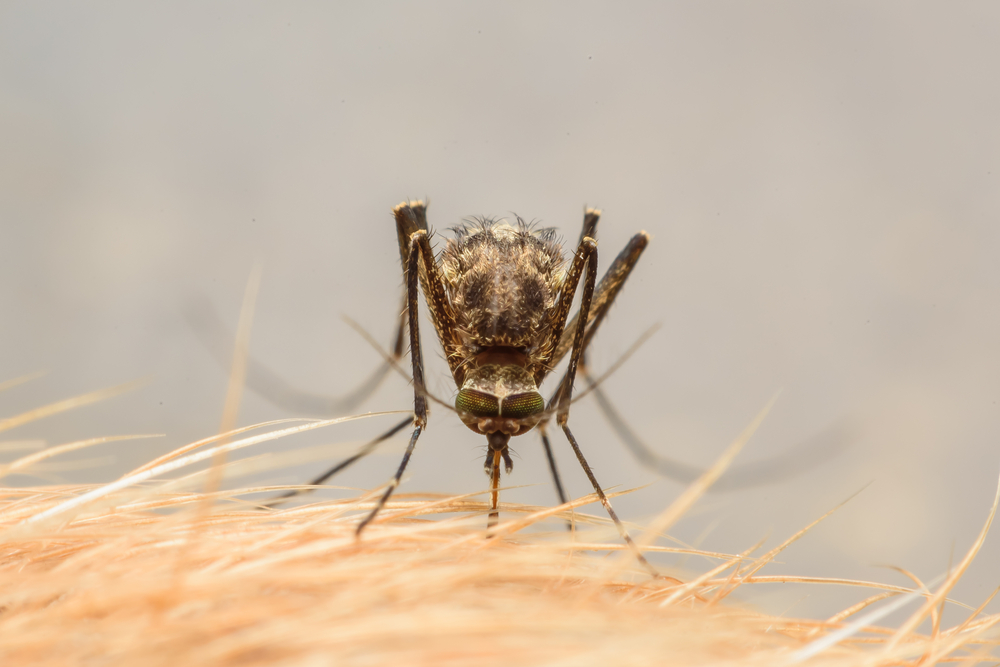Transmitted by mosquitoes, heartworm disease is a prevalent, serious condition that affects dogs, cats, and other mammals. Dogs and other canids are primary heartworm hosts, but any mammal can be affected. Understanding the causes, signs, and preventive measures is crucial for every pet owner to safeguard their furry companion from contracting this condition. Our Lytle Veterinary Clinic team explains heartworm disease and describes effective strategies you can take to keep your four-legged friend safe.
What is heartworm disease in pets?
Heartworm disease is caused by Dirofilaria immitis, a parasitic worm transmitted to pets through an infected mosquito’s bite. These tiny parasites primarily target the cardiovascular system in infected pets’ hearts, lungs, and blood vessels. The worms take approximately two months to proliferate and grow, causing severe damage to vital organs and leading to life-threatening complications if left untreated.
Heartworm disease classes and signs in pets
Heartworms can live in an infected host for several years before the infected pet exhibits illness signs. Heartworm disease infection is categorized into four classes:
- Class 1 — No or few signs other than a mild cough
- Class 2 — Persistent cough and exercise reluctance
- Class 3 — Lethargy, weak pulse, and abnormal lung sounds
- Class 4 — Life-threatening cardiovascular failure
Heartworm disease signs vary depending on the infection’s severity and the affected animal’s species. In dogs, common signs may include:
- Persistent coughing
- Lethargy and weakness
- Difficulty breathing
- Weight loss
- Reduced appetite
- Abdominal enlargement as a result of fluid accumulation
- Collapse or fainting episodes
Although heartworm disease usually affects dogs, cats can also contract this condition. Cats infected with heartworms may exhibit signs such as:
- Coughing
- Asthma-like attacks
- Vomiting
- Appetite loss
- Weight loss
- Sudden collapse or seizures in severe cases
Diagnosing and treating heartworm disease in pets
Many pets are diagnosed with heartworm disease once they show signs or after the condition is fully established. This is concerning because heartworm disease is challenging to treat in later stages. During your four-legged friend’s annual wellness exam, our Lytle Veterinary Clinic team performs antigen and microfilaria tests to determine if your pet is heartworm-positive. Chest X-rays and echocardiography can show heartworm size and quantity.
If your pet is heartworm-positive, their exercise and activity must be restricted to prevent further heart damage. Our team will start your four-legged friend on specific drugs aimed at killing heartworms. In some cases, surgically extracting the heartworms is necessary, as is supportive care to manage the disease’s effects on your pet’s organ health.
Heartworm disease prevention in pets

Prevention is paramount to protecting your furry pal from heartworm disease. Prevention is not only less expensive than treatment but is also safer for your pet. Eliminating established heartworms is a precarious, lengthy process that’s only occasionally successful. Keep your four-legged friend safe by taking these preventive measures:
- Administer monthly heartworm preventives — Administering a monthly veterinarian-prescribed heartworm preventive medication to your pet is the most effective way to protect them against heartworm disease. These medications are available in various forms, including chewables, topical treatments, and injectables. Ensure your pet is on their prevention medication throughout the year because mosquitoes are never entirely dormant.
- Schedule annual heartworm testing — Schedule annual heartworm tests for your pet, even if they are on preventive medication. Early heartworm detection infection allows for timely intervention and better treatment outcomes.
- Control the mosquito population around your home — Create a mosquito-free environment by using mosquito nets or screens in windows and doors, especially during the warmer months when mosquitoes are especially active. Additionally, eliminate standing water sources in your yard to discourage mosquito breeding grounds. You can also minimize your pet’s mosquito exposure by keeping them indoors during dawn and dusk—peak mosquito activity hours—and by using pet-safe mosquito repellents.
Heartworm disease is a serious problem, especially in coastal states such as Texas. By understanding your pet’s heartworm disease risk and implementing preventive measures, you can protect your four-legged friend from this potentially deadly disease. Is your pet on heartworm prevention? Take a bite out of your pet’s risk by calling our Lytle Veterinary Clinic team and initiating your four-legged friend’s monthly heartworm preventives.

